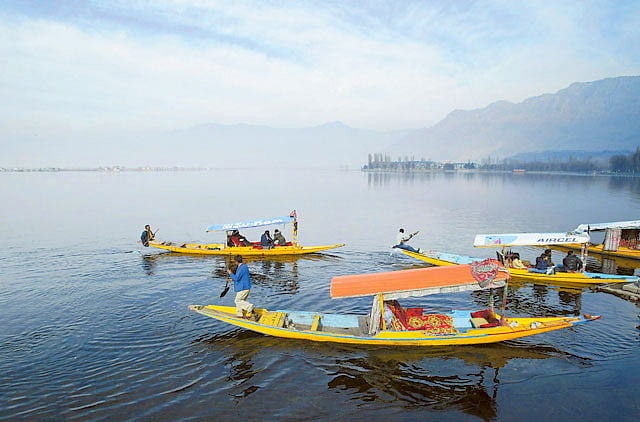India on Monday revoked the special status of Kashmir in a bid to fully integrate its only Muslim-majority region with the rest of the country.
Here’s a timeline of key events that led to the most far-reaching political move on the troubled Himalayan territory in nearly seven decades:
August 5, 2019
Home Minister Amit Shah moves Jammu and Kashmir (Reorganisation) Bill, which proposes to convert Jammu and Kashmir into a Union Territory with legislature and Ladakh region into another Union Territory without legislature.
August 4, 2019
National Conference leader Omar Abdullah and PDP chief Mehbooba Mufti put under house arrest. Home Minister Amit Shah holds meeting with National Security Advisor Ajit Doval, Union Home Secretary Rajiv Gauba and other top security officials
August 3, 2019
5,829 passengers were taken out of the Valley through civilian aircrafts, announced Airport Authority of India announced. The 43-day-long "Machail Yatra" to Goddess Durga shrine in Jammu and Kashmir’s Kishtwar district was suspended
August 2, 2019
Amarnath Yatra cancelled; tourists asked to move out.
February 22 2019
India's Union minister Nitin Gadkari says in New Delhi that India has decided to "stop" the flow of its share of water to Pakistan from rivers under the Indus Waters Treaty (IWT) after the Pulwama terror attack.
February 14, 2019
A suicide bomber crashes a car packed with 300kg of explosives into a convoy of Central Reserve Police Forces (CRPF), killing more than 40 Indian paramilitary personnel, and injuring at least 70. The terror attack took place in Pulwama, about 20km from Srinagar, capital of Jammu and Kashmir territory it controls. India vows retaliation.
November 2016
Seven Indian soldiers are killed after militants disguised as policemen storm a major army base near the frontier with Pakistan.
2016
India launches what it calls "surgical strikes" on targets in Pakistani Kashmir in September, less than two weeks after a militant attack on an Indian army base leaves 19 soldiers dead. Pakistan denies the strikes took place.
2015 March
India's ruling BJP party is sworn into government in Indian-administered Kashmir for first time in coalition with local People's Democratic Party, with the latter's Mufti Mohammad Sayeed as chief minister.
2013 February
Kashmiri Jaish-e-Mohammed member Mohammad Afzal Guru hanged over role in 2001 Indian parliament terror attack, prompting protests in which two young men are killed.
1999
Pakistan-backed militants cross the disputed Kashmir border, seizing Indian military posts in the icy heights of the Kargil mountains. Indian troops push the intruders back, ending the 10-week Kargil conflict which costs 1,000 lives on both sides.
1984
Indian forces seize the Siachen Glacier, a remote and uninhabited territory high in the Karakoram Range, also claimed by Pakistan. The first of many battles are fought over the high-altitude stretch, until a ceasefire is signed in 2003.
1972
India and Pakistan agree to a ceasefire, and sign the Simla Agreement. After the Simla Agreement, India and Pakistan agree to have a “Line of Control” (LoC).
1971
India and Pakistan fight another war — not over Kashmir — but over Islamabad's rule in then-East Pakistan, with New Delhi supporting Bengali nationalists seeking independence for what would become Bangladesh. India's air force conducts bombing raids inside Pakistan.
1965
India and Pakistan fight a second brief war over Kashmir before a ceasefire is declared.
1949
A mutually-agreed ceasefire line was drawn in order to resolve the dispute between India and Pakistan over Kashmir.
1947
The first war breaks out over Kashmir after the British exit, which led to the "partition" of the subcontinent, dividing it into India and Pakistan. The maharaja (ruler) of Kashmir accedes to India as tribal fighters from Pakistan launch attacks.
1948
India takes the Kashmir problem to the UN Security Council. The resolution orders the cessation of hostilities and a formulation of a truce agreement, and that a plebiscite should determine the future of Jammu and Kashmir. However, both countries cannot agree on the terms of demilitarisation.
October, 1947
Indo-Pakistani War of 1947: Thousands of tribals Pakistan’sfrom North West Frontier Province attack Kashmir and the Maharaja’s forces. The Maharaja ask India for help, who abides under the conditions that he relinquish control over defense, communication and foreign affairs to India. The Maharaja agrees and signs the Instrument of Accession.
19 June, 1947
Lord Mountbatten visits Kashmir for 5 days to persuade the Maharaja to accede to India or Pakistan. The Maharaja showed reluctance
3 June, 1947
Mountbatten proposes the partition plan to divide British India into independent dominions of India and Pakistan.
July, 1946
The Maharaja declares that Kashmiris would decide their own destiny without outside interference
June, 1939
Under Sheikh Abdullah's leadership, the Muslim Conference changes its name to National Conference and opens membership to people of all religions
September, 1934
The first elections for the Praja Sabha (the state's legislative assembly) held. The Muslim Conference wins 14 of the 21 seats reserved for Muslims
June 1932
The All Jammu and Kashmir Muslim Conference is founded by Sheikh Abdullah in collaboration with Chaudhry Ghulam Abbas to fight for the rights of the State's Muslims
1931
A movement against Kashmir ruler Maharaja Hari Singh begins which was later suppressed by the State forces. Hari Singh was part of a Hindu Dogra dynasty that ruled over a majority Muslim State.
1846
The Treaty of Amritsar, executed by the British East India Company and Raja Gulab Singh of Jammu after the First Anglo-Sikh War, establishes the independent princely state of Jammu and Kashmir.
Sign up for the Daily Briefing
Get the latest news and updates straight to your inbox
Network Links
GN StoreDownload our app
© Al Nisr Publishing LLC 2025. All rights reserved.
